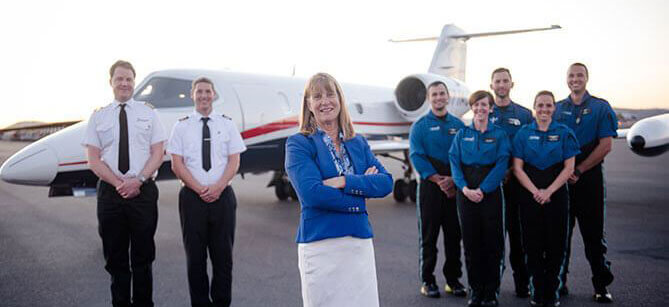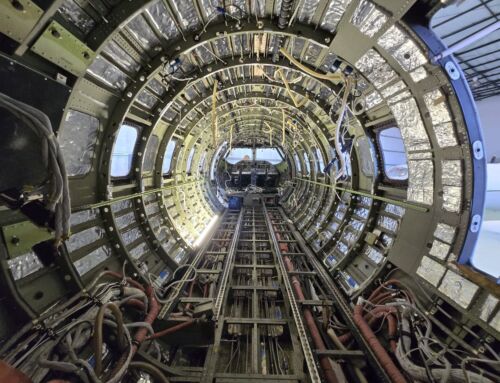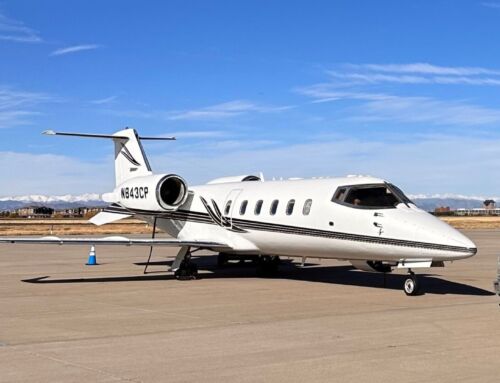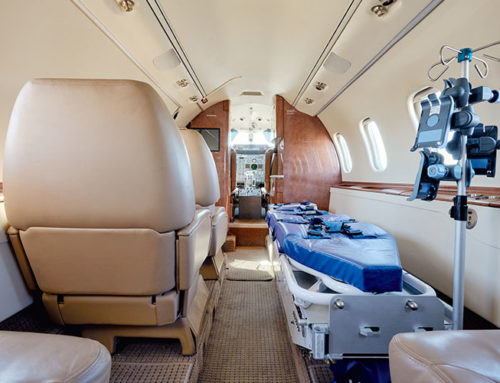We are honored The International Travel and Health Journal wrote a profile about AirCARE1, featured in the AirMed&Rescue Provider Profile section. We are always excited to share our unique approach to aeromedical care and grateful we’ve been able to continue to safely transport patients during the pandemic. Read our featured article below.
Published October 2, 2020 on www.airmedandrescue.org
Doing aeromedical care differently
Critical care flight nurse Denise Waye envisioned an aeromedical company that would incorporate holistic approaches and put the patient first. Now, 16 years later, AirCARE1 is continuously growing
In 2004, Waye’s vision became a reality and she co-founded AirCARE1 with a retired Air Force colonel who had become a medevac pilot. They started the company with one leased aircraft, three employees, and a base of operations in Albuquerque, New Mexico. From the very beginning, being an accredited company was important to her, and in 2007 the company received its first accreditation from the Commission on Accreditation of Medical Transport Systems (CAMTS).
Shortly thereafter, a second base was opened in Phoenix, Arizona. The company went from strength to strengthen, with its own Part 135 Air Carrier certificate being awarded not long afterwards. While continuing to grow its client base and expand its operations, the company obtained its second accreditation, this one from the European Aero-Medical Institute (EURAMI). In 2014, a mutual decision was made, and Waye bought out her business partner and AirCARE1 became a 100-per-cent certified female-led and owned company.
What makes AirCARE1 different?
Almost 20 years ago, Waye was working for a long-range air ambulance company as a critical care flight nurse and absolutely loved what she did. She loved taking care of her patients while transporting them to various destinations. Being a flight nurse was very fulfilling for her, and she felt like she was making a difference in the lives of her patients and their family members.
However, Waye found that her values and ideas regarding safety and patient care were not shared by the company she worked for. Multiple suggestions to management for positive change fell on deaf ears. This generated a desire to start her own air ambulance company, so that she could provide the kind of care that made a difference in the lives of patients and their families.
Waye wanted her company to be unlike any other. Her vision and passion were to provide not only the highest level of clinical care for patients, but to provide care that would address the holistic needs of the individual, including their physical, mental, and emotional health, by utilizing holistic measures. This multi-faceted approach would help start the healing process while providing an additional level of comfort and peace of mind for patients.
During the past 16 years, AirCARE1 has continued to grow in different markets, including commercial medical escorts, while also expanding its air ambulance fleet to six company-owned aircraft, comprising three Learjet 35s, one Learjet 36 and two Learjet 60s.
Today, AirCARE1 transports neonatal, pediatric, and adult (including bariatric) patients – who are in stable to very critical conditions. The company also provides ECMO transports with a specialty team.
Identify a problem, find a solution
Bryce Nelson, Business Development Manager at AirCARE1, explained the company’s core values: “We focus on being honest in every aspect with patients and their family members as we want them to have someone they can trust when they face difficult decisions and need an honest opinion. We are honored by the trust afforded to us by our clients and want to uphold that trust by being open, no matter what the consequence.
“When issues happen, we problem solve to find the best solution possible, so when we call our clients, we can explain the issue and provide a solution at the same time. Our clients appreciate when we contact them with solutions instead of just dropping a problem back into their laps. Every time we do a flight, we always like to have a backup plan just in case something happens.”
Holistic approach decreases stress
What sets AirCARE1 apart from others is its unique approach to patient care that utilizes holistic measures to decrease the stressors of flight for patients. The company provides its patients with noise-cancelling headsets with therapeutic music, as well as hand massages with aromatherapy.
“These measures help provide relaxation and comfort for our patients during their flight.
This approach has been a mainstay of our company since the very beginning,” said Nelson.
“We understand the power of music and its healing powers through its far-reaching effects on brain chemistry. By utilizing noise-cancelling headsets to decrease noise levels, patients are afforded the opportunity to listen to the calming influence of music.”
Along with music, AirCARE1’s clinicians utilize the ‘power of human touch’ through hand massages. “We found the most effective hand massages employ aromatherapy, as smell is an incredibly powerful sense. Pleasant scents help enhance a sense of wellbeing and additional relaxation,” Nelson explained.
Using technology to identify hazards
Technologies and innovations at AirCARE1 include web-based programs that allow its teams to review and accept flights, identify and fill out process improvement and hazard identification forms in regards to safety situations and perform operational risk management to assess and mitigate any flight or patient risk before a flight commences. This information can be uploaded remotely so that individuals exercising operational control can monitor and adjust to situations as they arise.
AirCARE1 flight crews also utilize electronic flight bags, which contain digital versions of aviation charts, the ability to run aircraft performance calculations, as well as access company policies and procedures on the go. Additionally, pilots can overlay current weather conditions on top of charts and flight routing for real-time weather information in the cockpit. These features significantly reduce pilot workload and enhance situational awareness. The medical crew utilize technology that quickly identifies and responds to any changes in patients’ conditions.
Nelson commented: “Employing technology in aviation and medicine has enhanced the safety of operations and has provided safety nets at key points that minimize and mitigate risks.
“Technology has enabled AirCARE1 to work more efficiently and focus on what matters most, the patient.”
Challenging missions during Covid-19
Due to Covid-19, a lot of recent missions have been challenging, says Nelson. One particularly challenging air ambulance mission was picking up a diplomat from a South American country and transporting her to meet a commercial airline in the US, so she could travel to her home country to recover and receive additional medical treatment.
Nelson explained: “There were many hurdles to overcome in order to complete this mission safely and in a timely fashion. Our first issue we encountered was flying into a country where the airport was closed to all normal air travel due to Covid-19. We would need to obtain a diplomatic permit to land at the airport. We were also told, once we obtained a permit, our crew would not be allowed to exit the airport and, thus, would not be able to overnight.
“Another challenge came when our patient would have to transition through the US without a US visa in order for her to meet her commercial flight on the West coast. This limited us on which ports of entry we could transit through.
“The final challenge was ensuring we delivered the patient to her flight on time as there was only one flight a day back to her home country. Since the patient was a high-level diplomat, we also had security issues to contend with. Our time had to be spot-on as there was not much room for any unforeseen delays. Timing was of the essence.
“Working around the clock, our team was able to co-ordinate all logistics of the flight with the last logistical pieces coming together shortly before the flight commenced. In the end, the mission went flawlessly, and the patient was safely transported back to their home country of Australia.”
Expanding the fleet
Over the last year, AirCARE1 started upgrading its fleet from Learjet 35/36s to Learjet 60s.
“The first Learjet 60 became operational last year, and we have been very pleased with this aircraft platform. We wanted an aircraft that had a longer range than our 35s as we move into worldwide operations,” explained Nelson. “So far, we have replaced half of our fleet and are looking to replace the other half in the next few years. As we expand into worldwide operations, we will be looking for even longer-range aircraft as well.
“We are continuing to expand our business opportunities that will generate a great return for AirCARE1 in the near future as we continue to expand our service throughout the world. Over the next 10 years we want to continue to make a mark in this industry and be known as a trusted and reputable company.”




